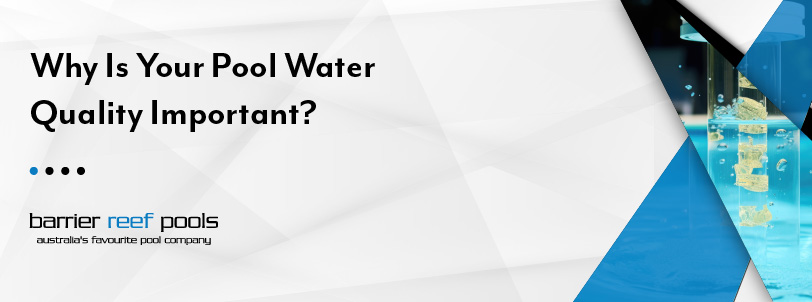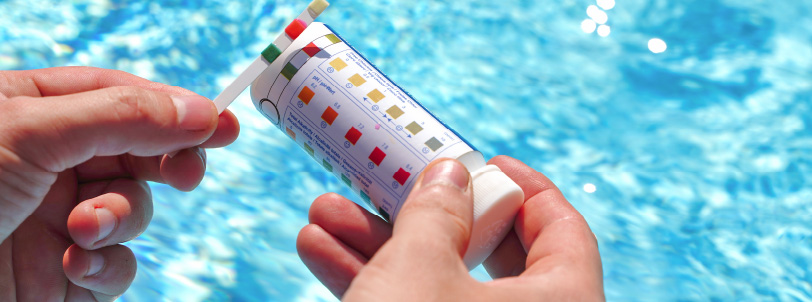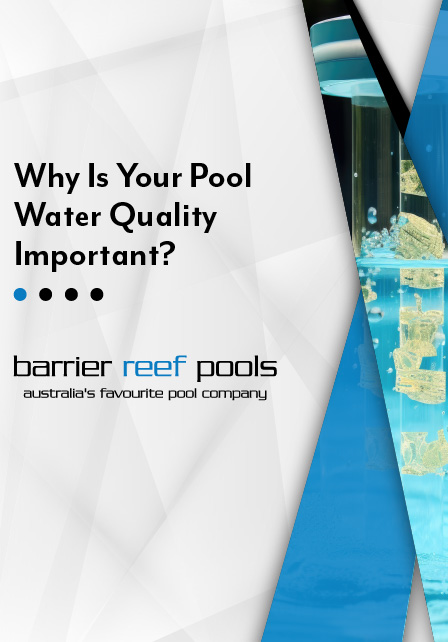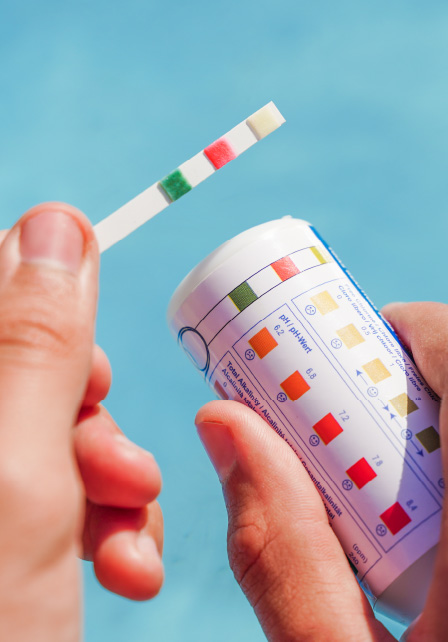Why Is Your Pool Water Quality Important?
Owning a swimming pool is a source of immense pleasure, but it also entails a range of responsibilities. One of the most crucial tasks is ensuring that the water quality is well-maintained. The significance of keeping your pool's water balanced and clean cannot be overstated, as it impacts various aspects. From promoting optimal health and safety for swimmers to ensuring the longevity of your pool, maintaining water quality remains paramount. Therefore, it is essential to dedicate time and effort to this essential aspect of pool ownership.

The Consequences of Poor Pool Water Quality
Health Implications
The primary and foremost consideration is the health aspect. Pools that are not adequately maintained have the potential to transform into breeding grounds for harmful bacteria and algae, thereby increasing the risk of contracting various illnesses. Waterborne pathogens such as E. coli have the potential to cause gastrointestinal infections, while the presence of Pseudomonas aeruginosa can result in ear and skin infections. Additionally, the absence of proper chemical balance within the pool can lead to skin and eye irritation, further highlighting the importance of maintaining a vigilant approach towards pool maintenance.
Safety Concerns
Another important aspect to consider is the quality of the water, which directly affects the visibility of the pool. This is of utmost importance when it comes to ensuring safety. Having clear water makes it easier to spot individuals who may be in distress or objects that could potentially pose a safety hazard. On the flip side, if the water is cloudy or discoloured, it can obscure these hazards, increasing the risk of accidents. So, it’s crucial to maintain clear and pristine water in the pool to keep everyone safe and sound.
Pool Longevity
The longevity of your pool’s components is of utmost importance. Water with imbalanced pH levels can lead to corrosion of metal parts, such as ladders and light fixtures, and cause damage to the pool liner. Additionally, high calcium hardness levels can result in scale deposits that may clog pipes and cause harm to pumps and heaters. Moreover, improperly balanced water can also cause unsightly stains on the pool surface, affecting its overall appearance and appeal. It is crucial to ensure proper water balance and maintenance to protect your pool and enjoy it for years to come.

Cost Implications
Ensuring the quality of your pool water can lead to significant long-term savings. While there may be a minor upfront investment for testing kits and chemicals, this is far outweighed by the potential expenses of treating illnesses, repairing or replacing damaged equipment, or addressing safety incidents caused by inadequate water quality. By proactively maintaining your pool’s water quality, you not only protect your health and the longevity of your equipment but also safeguard against unforeseen costs and incidents that can arise from neglecting this crucial aspect of pool maintenance.
Environmental Impact
Poorly maintained pool water quality can also result in an adverse environmental effect. Overuse of pool chemicals can lead to water pollution when the pool water is drained or backwashed into the surrounding environment. Moreover, if the water quality is not adequately handled, it can foster the growth of algae and bacteria, which when left unchecked, can disturb the local ecosystem. Hence, managing the pool water quality is not only a responsibility for individual health and safety but also an ethical obligation towards environmental stewardship.
Enhancing the Swimming Experience
An essential but often overlooked aspect of maintaining pool water quality is the enhancement of the swimming experience. Crystal clear, well-balanced pool water significantly improves the comfort and enjoyment of swimmers. It reduces the likelihood of skin irritation and unpleasant odours, making each swimming session a refreshing and rewarding experience. Therefore, maintaining a high standard of pool water quality contributes positively to the overall satisfaction of pool users.

Testing Your Pool Water Quality
In order to keep the water in your swimming pool safe and clean, regular testing is absolutely necessary. Here is a step-by-step guide on how to conduct this task:
- Acquire a Pool Water Testing Kit: These kits are readily available online or at your local pool supply store. They typically include testing strips and a colour chart to help you interpret the results.
- Collect a Water Sample: Use a clean, plastic container to gather water from your pool. For an accurate reading, it’s best to collect the sample from about 12-18 inches below the pool surface.
- Test the Water: Carefully follow the instructions provided with your testing kit. Usually, this involves dipping a testing strip into your water sample and then comparing the resulting colour change to the provided chart.
- Interpret the Results: The colour chart will help you interpret your results, allowing you to determine levels of crucial factors like pH, chlorine, and alkalinity.
- Make Adjustments as Necessary: Depending on your results, you may need to adjust the chemical balance of your pool. If you are unsure about how to do this, seek advice from a pool care professional.
- Record Your Results: Keep a record of your pool’s water test results. This historical data can be useful for identifying trends or issues over time.
By ensuring regular water testing is part of your pool maintenance routine, you’ll contribute to the overall health, safety, and longevity of your pool – and, consequently, your enjoyment of it.
In conclusion, maintaining the water quality in your swimming pool goes far beyond aesthetics and comfort. It is a multifaceted responsibility that impacts your health, safety, financial wellbeing, and environmental stewardship. By regularly testing and adjusting the water, and keeping meticulous records, pool owners can protect their investment, enhance their swimming experience, and ensure their well-being. Indeed, the diligent monitoring and maintenance of pool water quality is a small price to pay for the immense benefits it brings.
Take the first step towards enhancing your lifestyle with a pristine, high-quality fibreglass pool from Barrier Reef Pools. As Australia’s leading pool manufacturer, we guarantee the perfect blend of design, durability, and luxury in our broad range of pools. Don’t compromise on your health, safety, or the longevity of your pool — choose Barrier Reef Pools, where quality meets excellence. Contact us today for a free quote and let us create your dream pool together.
Why Is Your Pool Water Quality Important?
Owning a swimming pool is a source of immense pleasure, but it also entails a range of responsibilities. One of the most crucial tasks is ensuring that the water quality is well-maintained. The significance of keeping your pool's water balanced and clean cannot be overstated, as it impacts various aspects. From promoting optimal health and safety for swimmers to ensuring the longevity of your pool, maintaining water quality remains paramount. Therefore, it is essential to dedicate time and effort to this essential aspect of pool ownership.

The Consequences of Poor Pool Water Quality
Health Implications
The primary and foremost consideration is the health aspect. Pools that are not adequately maintained have the potential to transform into breeding grounds for harmful bacteria and algae, thereby increasing the risk of contracting various illnesses. Waterborne pathogens such as E. coli have the potential to cause gastrointestinal infections, while the presence of Pseudomonas aeruginosa can result in ear and skin infections. Additionally, the absence of proper chemical balance within the pool can lead to skin and eye irritation, further highlighting the importance of maintaining a vigilant approach towards pool maintenance.
Safety Concerns
Another important aspect to consider is the quality of the water, which directly affects the visibility of the pool. This is of utmost importance when it comes to ensuring safety. Having clear water makes it easier to spot individuals who may be in distress or objects that could potentially pose a safety hazard. On the flip side, if the water is cloudy or discoloured, it can obscure these hazards, increasing the risk of accidents. So, it’s crucial to maintain clear and pristine water in the pool to keep everyone safe and sound.
Pool Longevity
The longevity of your pool’s components is of utmost importance. Water with imbalanced pH levels can lead to corrosion of metal parts, such as ladders and light fixtures, and cause damage to the pool liner. Additionally, high calcium hardness levels can result in scale deposits that may clog pipes and cause harm to pumps and heaters. Moreover, improperly balanced water can also cause unsightly stains on the pool surface, affecting its overall appearance and appeal. It is crucial to ensure proper water balance and maintenance to protect your pool and enjoy it for years to come.

Cost Implications
Ensuring the quality of your pool water can lead to significant long-term savings. While there may be a minor upfront investment for testing kits and chemicals, this is far outweighed by the potential expenses of treating illnesses, repairing or replacing damaged equipment, or addressing safety incidents caused by inadequate water quality. By proactively maintaining your pool’s water quality, you not only protect your health and the longevity of your equipment but also safeguard against unforeseen costs and incidents that can arise from neglecting this crucial aspect of pool maintenance.
Environmental Impact
Poorly maintained pool water quality can also result in an adverse environmental effect. Overuse of pool chemicals can lead to water pollution when the pool water is drained or backwashed into the surrounding environment. Moreover, if the water quality is not adequately handled, it can foster the growth of algae and bacteria, which when left unchecked, can disturb the local ecosystem. Hence, managing the pool water quality is not only a responsibility for individual health and safety but also an ethical obligation towards environmental stewardship.
Enhancing the Swimming Experience
An essential but often overlooked aspect of maintaining pool water quality is the enhancement of the swimming experience. Crystal clear, well-balanced pool water significantly improves the comfort and enjoyment of swimmers. It reduces the likelihood of skin irritation and unpleasant odours, making each swimming session a refreshing and rewarding experience. Therefore, maintaining a high standard of pool water quality contributes positively to the overall satisfaction of pool users.

Testing Your Pool Water Quality
In order to keep the water in your swimming pool safe and clean, regular testing is absolutely necessary. Here is a step-by-step guide on how to conduct this task:
- Acquire a Pool Water Testing Kit: These kits are readily available online or at your local pool supply store. They typically include testing strips and a colour chart to help you interpret the results.
- Collect a Water Sample: Use a clean, plastic container to gather water from your pool. For an accurate reading, it’s best to collect the sample from about 12-18 inches below the pool surface.
- Test the Water: Carefully follow the instructions provided with your testing kit. Usually, this involves dipping a testing strip into your water sample and then comparing the resulting colour change to the provided chart.
- Interpret the Results: The colour chart will help you interpret your results, allowing you to determine levels of crucial factors like pH, chlorine, and alkalinity.
- Make Adjustments as Necessary: Depending on your results, you may need to adjust the chemical balance of your pool. If you are unsure about how to do this, seek advice from a pool care professional.
- Record Your Results: Keep a record of your pool’s water test results. This historical data can be useful for identifying trends or issues over time.
By ensuring regular water testing is part of your pool maintenance routine, you’ll contribute to the overall health, safety, and longevity of your pool – and, consequently, your enjoyment of it.
In conclusion, maintaining the water quality in your swimming pool goes far beyond aesthetics and comfort. It is a multifaceted responsibility that impacts your health, safety, financial wellbeing, and environmental stewardship. By regularly testing and adjusting the water, and keeping meticulous records, pool owners can protect their investment, enhance their swimming experience, and ensure their well-being. Indeed, the diligent monitoring and maintenance of pool water quality is a small price to pay for the immense benefits it brings.
Take the first step towards enhancing your lifestyle with a pristine, high-quality fibreglass pool from Barrier Reef Pools. As Australia’s leading pool manufacturer, we guarantee the perfect blend of design, durability, and luxury in our broad range of pools. Don’t compromise on your health, safety, or the longevity of your pool — choose Barrier Reef Pools, where quality meets excellence. Contact us today for a free quote and let us create your dream pool together.


